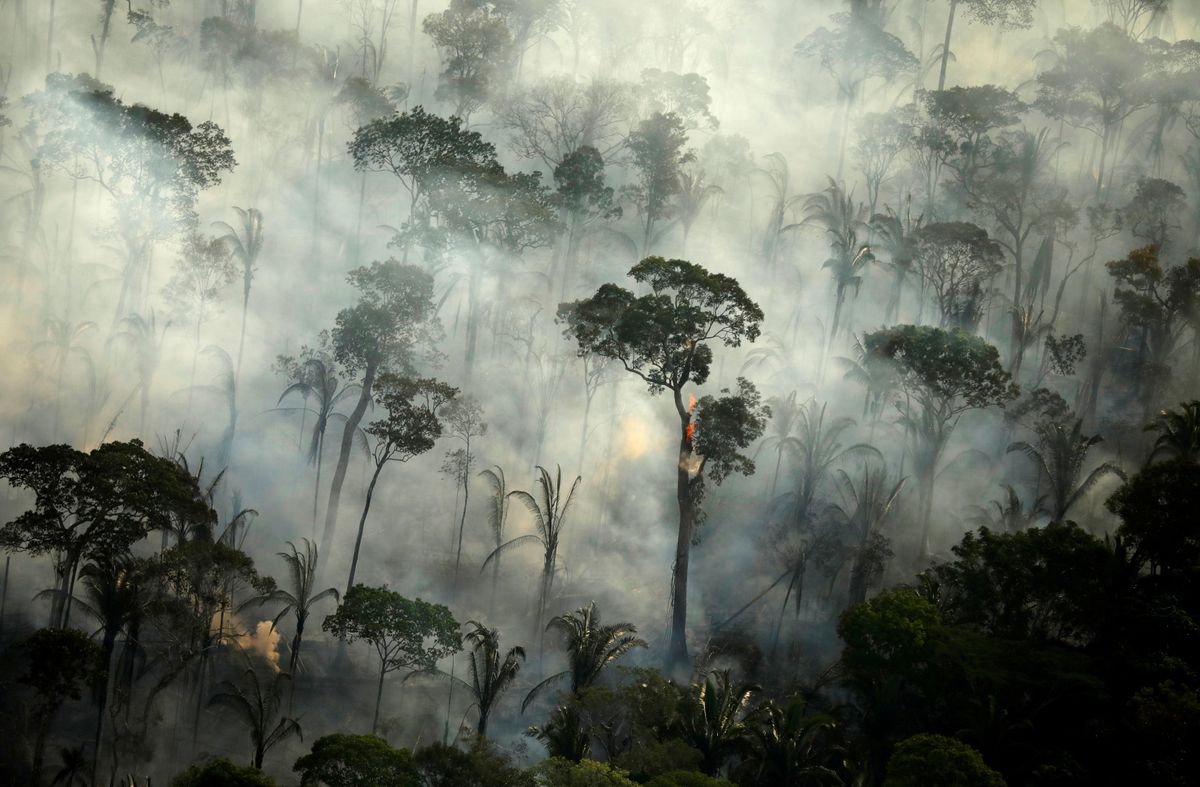Those fighting to halt climate change call the Amazon rainforest the "lungs of Earth," and they're frustrated that Brazil's current president has made his country a chain-smoker.
A healthy Amazon is crucial for the global fight against climate change. Human activity is pumping unsustainable amounts of carbon into the atmosphere, trapping enough heat to warm the planet in ways that profoundly disrupt the climate. Trees, and the soils they grow in, store carbon that might otherwise reach the atmosphere, but trees that are cut down or burned release more carbon into the air.
That makes rapid deforestation of the Amazon an urgent problem for the entire planet. Clearcutting of trees in the region has been a problem for decades, but the January 2019 inauguration of Jair Bolsonaro as president of Brazil, home to more than 60 percent of the remaining Amazon tree cover, has made matters much worse.
Bolsonaro has stripped environmental protection agencies of funding and manpower, which flashes a bright green light to those who want to cut and burn trees to open land for farms and cattle ranches. Bolsonaro's bid to use Brazil's military to police the Amazon has failed, perhaps because the president himself and some of Brazil's army brass may not believe in the mission.
The results speak for themselves. In 2019, more than one-third of all destruction of the world's tropical forests took place inside Brazil alone. The Amazon lost more trees in 2019 than at any point in the previous decade, and then, despite the pandemic, beat that record again in 2020. When confronted with evidence that the number of fires in the Amazon has spiked sharply on his watch, Bolsonaro accused "greenies" –environmental activists — of setting the fires deliberately to "bring problems to Brazil."
Bolsonaro and his supporters in Brazil don't like it when outsiders demand new protections for the Amazon. "OUR SOVEREIGNTY IS NON-NEGOTIABLE," he tweeted last year in response to threats of economic sanctions over the Amazon from then-US presidential candidate Joe Biden.
But outsiders concerned about the climate are increasing their pressure. The EU has warned that failure to protect the rainforest is an important obstacle to completion of a blockbuster trade deal between Europe and Mercosur, a Brazil-dominated South American trade bloc. Institutional investors are pushing too. But Brazil has (so far) been able to resist these pressures, in part because it exports far more to China than to either the US or Europe, and Beijing isn't pushing for change.
That said, economic threats have helped mobilize Brazil's business community. Many companies have promised to cut carbon emissions and to remove products produced via deforestation from their supply chains. An alliance of Brazilian CEOs and scientists has called for investment in sustainable development.
But so far, Bolsonaro has shrugged off external and internal pressure for a change of course, in part, perhaps, because a challenging election campaign next year might depend on the continued support of his political base — including farmers and ranchers in the Amazon, who say that their industry is important for feeding Brazil and maintaining the country's position as an agriculture superpower. In particular, Brazil is now the world's top exporter of soy beans.
Joe Biden hopes a mix of carrots and sticks might help. The new US president has asked his climate envoy John Kerry to lead an international effort to raise $20 billion for the Amazon, though there are plenty of debates to come over how that money should be used. The money won't flow unless deforestation is reduced, but the new US president hopes that engaging, rather than threatening, Bolsonaro can produce a better result.
In the end, the size and density of the Amazon is itself part of the problem. The ground it covers is larger than all of Western Europe, so whatever agreements are forged and promises made, it will never be easy to police Amazon deforestation.
But Ibama, Brazil's civilian environmental protection agency, must be given the resources to try, climate experts warn, because those trees are crucial for all of us.






